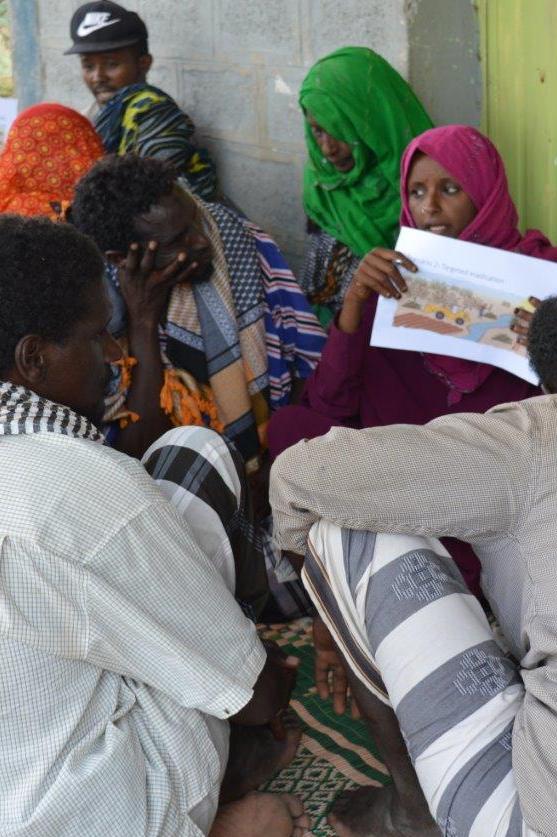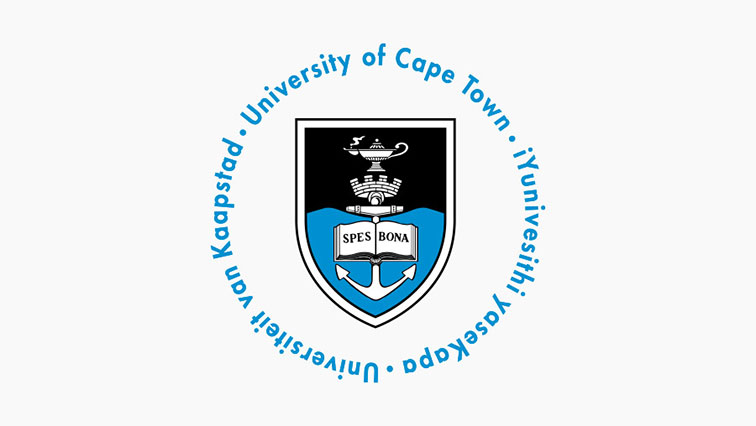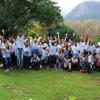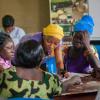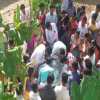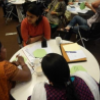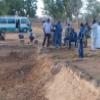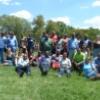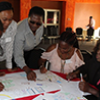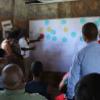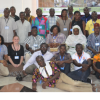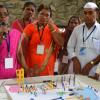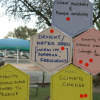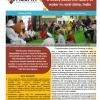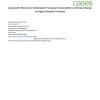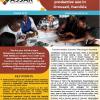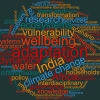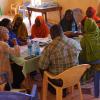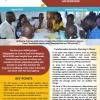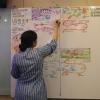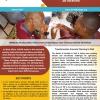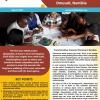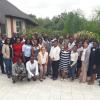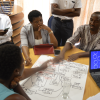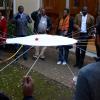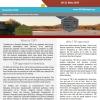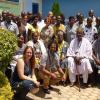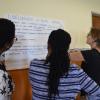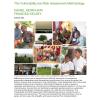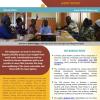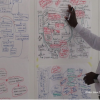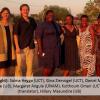| Information brief |
ASSAR |
2016 |
What is Transformative Scenario Planning? |
|
|
| Information brief |
ASSAR |
2019 |
A focus on wellbeing can link adaptation to outcomes that matter to people. |
|
|
| Information brief |
ASSAR |
2019 |
Adaptation is about people. |
|
|
| Information brief |
ASSAR |
2019 |
Supporting resilient agriculture in semi-arid Ghana. |
|
|
| Journal article |
Few, R., Morchain, D., Spear, D., Mensah, A. and Bendapudi, R. |
2017 |
Transformation, adaptation and development: Relating concepts to practice. |
Palgrave Communications, 3: 17092. |
Summary |
| Journal article |
Morchain, D., Prati, G., Kelsey, F. and Ravon, L. |
2015 |
Summary |
| Journal article |
Morchain, D., Ziervogel, G., Spear, D., Masundire, H., Angula, M., Davies, J., Hegga, S. and Molefe C. |
2019 |
Building transformative capacity in southern Africa: Surfacing knowledge through participatory Vulnerability and Risk Assessments. |
Action Research, 17(1): 19-41. |
Summary |
| Journal article |
Olabisi, L. S., Liverpool-Tasie, S., Rivers III, L., Ligmann-Zielinska, A., Du, J., Denny, R., Marquart-Pyatt, S. and Sidibé, A. |
2018 |
Using participatory modeling processes to identify sources of climate risk in West Africa. |
Environment Systems and Decisions, 38(1): 23-32. |
Summary |
| Journal article |
Totin, E., Butler, J. R., Sidibé, A., Partey, S., Thornton, P. K. and Tabo, R. |
2018 |
Can scenario planning catalyse transformational change? Evaluating a climate change policy case study in Mali. |
Futures, 96: 44-56. |
Summary |
| Publication in progress |
Degefu, M. A., Assen, M., Few, R. and Tebboth, M. G. L. |
_ |
Perceptions of local people on impacts and management of Prosopis juliflora in arid/semi-arid regions of the Middle Awash Valley, Ethiopia. |
|
Poster |
| Publication in progress |
Few, R., Satyal, P. and Tebboth, M. G. L. |
_ |
Using a justice/ capabilities framing to understand people's vulnerability and adaptive capacity in the drylands of East Africa. |
|
|
| Publication in progress |
Hegga, S. and Kunamwene, I. |
_ |
Mapping actor influence in climate adaptation practices: The case of north-central Namibia. |
|
Poster |
| Publication in progress |
Hegga, S., Kunamwene, I. and Ziervogel, G. |
_ |
Local participation in decentralised water governance: Insights from north-central Namibia. |
|
Presentation |
| Publication in progress |
Perez, T. |
_ |
The power of workshop fatigue in transdisciplinary partnerships. |
|
Summary |
| Publication in progress |
Perez, T. |
_ |
Thinking differently about planning processes to enable climate change adaptation in Namibia and India. |
|
Summary |
| Publication in progress |
Pillai, S. and Bendapudi, R. |
_ |
Inclusion of local aspirations in village development plans in Maharashtra. |
|
|
| Publication in progress |
Satyal, P., Budds, J., Few, R., Bahir, A., Kibet, S. |
_ |
Adaptation to climate change in the context of decentralisation: Exploring multi-level governance of water-related issues in semi-arid areas of East Africa. |
|
Presentation |
| Publication in progress |
Sidibe, A., Totin, E. and Olabisi, L. S. |
_ |
Analysing consensus building in the participatory scenario process: A case of transformative scenario process in Mali. |
|
|
| Publication in progress |
Tebboth, M. G. L., Few, R., Assen, M. and Degefu, M. |
_ |
Valuing Prosopis juliflora? Analysing ecosystem service narratives to understand environmental management dilemmas. |
|
|
| Publication in progress |
Totin, E., Sidibe, A., Thompson-Hall, M. and Olabisi, L. |
_ |
Achieving sustainable future objectives under uncertain conditions: Application of a reflexive framework to adaptation trajectories in rural Mali. |
|
Summary |
| Report |
Alare, R. S., Adiku, P., Ansah, P., Mensah, A., Lawson, E. T., Thompson-Hall, M. and Hoffman, T. |
2017 |
Using Transformative Scenario Planning to think critically about the future of agriculture and food security in the Upper West region of Ghana. |
|
|
| Report |
ASSAR |
2017 |
Using Transformative Scenario Planning to think critically about the future of water for productive use in Omusati, Namibia. |
|
|
| Report |
ASSAR |
2019 |
Participatory processes build adaptive capacity and agency and can help transform systems. |
|
|
| Report |
Hegga, S. |
2016 |
Mapping out stakeholder influence on the implementation of climate change adaptation in Namibia – Short report. |
|
|
| Report |
Hegga, S. |
2016 |
Vulnerability and risk assessment in the Onesi Constituency, Omusati Region, Namibia: Towards improving livelihood adaptation to climate change – Short report. |
|
Summary |
| Report |
Hegga, S., Siyambango, N., Angula, M., Spear, D., Masundire, H., Molefe, C. and Morchain, D. |
2015 |
Stakeholder and influence network mapping exercise with the government, development and research actors in Namibia. |
|
|
| Report |
Hegga, S., Ziervogel, G., Angula, M., Spear, D., Nyamwanza, A., Ndeunyema, E., Kunamwene, I., Togarepi, C. and Morchain, D. |
2016 |
Vulnerability and Risk Assessment in Omusati Region in Namibia: Fostering people-centred adaptation to climate change. |
|
|
| Report |
Kale, E., Khabiya, P. and Joshi, V. |
2018 |
Using Transformative Scenario Planning to think critically about the future of water in rural Jalna, India. |
|
|
| Report |
Masundire, H., Morchain, D., Raditloaneng, N., Hegga, S., Ziervogel, G., Molefe, C., Angula, M. and Omari, K. |
2016 |
Vulnerability and risk assessment in Botswana’s Bobirwa sub-district: Fostering people-centred adaptation to climate change. |
|
|
| Report |
Mensah, A., Lawson E. T., Alare, R. S. and Ansah, P. |
2015 |
ASSAR West Africa Research-into-Use training workshop: Transformative Scenario Planning, stakeholder mapping and analysis, and Vulnerability and Risks Assessment. |
|
|
| Report |
Molefe, C. |
2016 |
Preparing for Transformative Scenario Planning in Botswana. |
|
|
| Report |
Molefe, C. and Masundire, H. |
2016 |
Climate change vulnerability and risk analysis in the Bobirwa sub-district, Botswana: Towards improving livelihood adaptation to climate – Short report. |
|
|
| Report |
Molefe, C. and Moesi, M. |
2016 |
Identifying stakeholders and vulnerabilities in Botswana’s Mahalapye sub-district. |
|
|
| Report |
Perez, T., Molefe, C. and Masundire, H. |
2018 |
Using Transformative Scenario Planning as a way to think differently about the future of land use in Bobirwa, Botswana. |
|
seTswana report |
| Report |
Poonacha, P. and Koduganti, M. |
2018 |
Using Transformative Scenario Planning to think critically about the future of water security in Bangalore. |
|
|
| Report |
Rokitzki, M. and Morchain, D. |
2015 |
Climate change adaptation practice in semi-arid regions: Views and insights by practitioners. |
|
|
| Report |
D’Souza, M., Daware, H., Misquitta, K. and Mhaskar, B. |
2018 |
Stakeholder engagement report: Watershed Organisation Trust. |
|
|
| Report |
Perez, T. |
2017 |
Using Transformative Scenario Planning to think critically about the future of water for productive use in Omusati, Namibia. |
|
Report |
| Report |
Poonacha, P. and Koduganti, M. |
2017 |
Thinking critically about the future of water security in Bengaluru, India using Transformative Scenario Planning. |
|
|
| Report |
Shalumbu, B. and Spear, D. |
2016 |
Preparing for Transformative Scenario Planning in Namibia. |
|
|
| Report |
Sidibé, A., Traore, E., Segnon, A., Thompson-Hall, M. and Hoffman, T. |
2017 |
Using Transformative Scenario Planning to think critically about the future of agriculture, natural resources and food security in Koutiala, Mali. |
|
|
| Report |
Singh, C., Basu, R. and Srinivas, A. |
2016 |
Livelihood vulnerability and adaptation in Kolar District, Karnataka, India: Mapping risks and responses. |
|
|
| Report |
Tebboth, M. G. L. and Few, R. |
2018 |
Considering the future of Prosopis: Participatory Scenario Analysis in Afar, Ethiopia. |
|
|
| Report |
Tebboth, M. G. L. and Few, R. |
2018 |
Considering the future of the rangelands: Participatory Scenario Analysis in Isiolo, Kenya. |
|
|
| Spotlight |
ASSAR |
2018 |
Spotlight on Transformative Scenario Planning. |
|
|
| Spotlight |
ASSAR |
2019 |
Spotlight on Research for Impact. |
|
|
| Toolkit/guide |
Morchain, D. and Kelsey, F. |
2016 |
Finding ways together to build resilience: The Vulnerability and Risk Assessment methodology. [Toolkit] |
Oxfam. |
Poster |
| Video |
ASSAR |
2016 |
Atelier de planification de Scenarios Transformateurs (Transformative Scenario Planning) a Koutiala (Mali, Juin 2016). |
|
|
| Video |
ASSAR |
2016 |
Transformative Scenario Planning in ASSAR. |
|
|
| Video |
ASSAR |
2016 |
Vulnerability and Risk Assessment workshop in northern Namibia. |
|
|
| Video |
ASSAR |
2017 |
Experiential learning to understand climate change. |
|
|
| Video |
ASSAR |
2017 |
Experiential learning: Farming Juggle. |
|
|
| Video |
ASSAR |
2017 |
Experiential learning: Paying for Predictions. |
|
|
| Video |
ASSAR |
2017 |
Experiential learning: Seasonal Forecast. |
|
|
| Video |
ASSAR |
2017 |
Experiential learning: Vulnerability Walk. |
|
|
| Video |
ASSAR |
2017 |
Preparing for Transformative Scenario Planning in India. |
|
|
| Video |
ASSAR |
2017 |
Transformative Scenario Planning in Ghana - Part 1. |
|
|
| Video |
ASSAR |
2017 |
Transformative Scenario Planning in Ghana - Part 2. |
|
|
| Video |
ASSAR |
2017 |
Using Transformative Scenario Planning to think critically about the future of water for productive use in Omusati, Namibia. |
|
|
| Video |
ASSAR |
2018 |
Considering the future of Prosopis: Participatory Scenario Analysis in Afar, Ethiopia. |
|
|
| Video |
ASSAR |
2018 |
How thinking about the future improved farming practices in Ghana’s Upper West region. |
|
|
| Video |
ASSAR |
2018 |
Preparing for the future of agriculture and food in Ghana’s Upper West region. |
|
|
| Video |
ASSAR |
2018 |
Theatre of the oppressed: Adaptation futures 2018. |
|
|
| Video |
ASSAR |
2018 |
Transformative Scenario Planning in practice: Jalna, India. |
|
|
| Video |
ASSAR |
2019 |
Challenging predominant views on climate change with Theatre of the Oppressed. Delft, Cape Town. January 2019. |
|
|
| Video |
ASSAR |
2019 |
Climate change adaptation in Bobirwa sub-district, Botswana. |
|
|
| Video |
ASSAR |
2019 |
Using Vulnerability and Risk Assessments to improve climate change adaptation in Bobirwa, Botswana. |
|
|
| Web article |
Thompson-Hall, M. |
2017 |
Meaningful discussions at the Transformative Scenario Planning table. |
Research to Action. 16 November 2017. |
|
| Working paper |
Davies, J., Spear, D., Omari, K., Morchain, D., Urquhart, P. and Zaremba, J. |
2017 |
Background paper on Botswana’s draft Drought Management Strategy. |
|
|
| Working paper |
Few, R., Bendapudi, R., Mensah, A. and Spear, D. |
2016 |
Transformation in adaptation: Learning from ASSAR’s regional diagnostic studies. |
|
|
| Working paper |
Few, R., Satyal P., Assen M., Camfield L., Leavy J. and McGahey D. |
2018 |
The development-adaptation spectrum in dryland East Africa: mapping risks, responses and critical questions for social research. |
|
|
| Video |
ASSAR |
2019 |
Adaptation is about people. |
|
|
